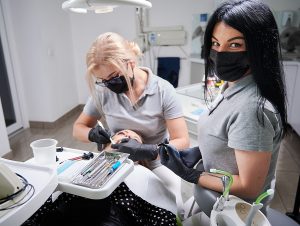How to Write a Dental Assistant Resume Without Experience
You’ve gone through dental assistant training, you’re excited about the prospect of a new career, you’ve heard that there are jobs to be had. But how do you get one? You know that you are a great candidate after your training, but without experience, how can you build a resume that will get the attention of a dental office?

Entry-Level Resume Expectations after Dental Assistant Training
You know you need to go through the training, but how do you become a dental assistant instead of a dental assistant student? To get your first job, you need a resume. An entry-level resume focuses on your training, education, and career goals more than previous work experience. Dental offices know that dental assistants will need to begin their career somewhere, and, when looking at a new dental assistant, they will focus on your training. This includes internships, certifications, and focused information about courses you’ve taken during your training. In your cover letter, you can address career goals as well as the soft skills you possess that would make you an excellent dental assistant, such as interpersonal skills, organizational skills, and a strong work ethic.
How to Write Your First Resume for a Dental Assistant Job
You can build a good resume by following an organized format. Often, your training program will help you build your resume as part of their job placement services.
- Header: This contains your contact information, such as your name, phone number, email, and mailing address. If you have a relevant website or a professional networking profile (such as a LinkedIn page), you can include those links. Within the header, include a personal summary. This is a short phrase, similar to a job title, that explains who you are or what you’re looking for in a job.
- Objective: It’s easy to confuse this with your professional summary, but your objective is different. A resume objective gives a prospective employer an overview of who you are professionally. This should include your career goals, industry aspirations, your most marketable skills, and training you hope to receive. Focus on why you are dedicated and committed to starting a dental assisting career and how your experience and skills will benefit the dental office.
- Relevant Certifications: If you’ve earned any certifications in dental assisting or related healthcare fields, this is where to share them. Not every state requires certifications, but they can help set you apart. List the credential name, issuing institution, date of issue, and any codes. If you are certified in X-ray, CPR, or first aid, this can show that you have taken extra steps to advance your industry knowledge.
- Clinical Skills: These are the hard skills you learned in your training or through your internship. Be specific. Look at the job posting and what skills the office is looking for, then focus on those that match. Some skills to focus on are CPR, dental equipment maintenance and operation, dental procedure preparation and documentation, patient care, payment processing, record keeping, electronic medical record management, and x-ray operation.
- Other Skills: Here you’ll list your soft skills that would make you an ideal fit for a dental assistant position, such as being compassionate, detail-orientation and organized with good communication skills and customer service skills. This will also be the place to highlight your commitment to being a strong team player.
- Education History: List degrees you have earned previously as well as degrees you are pursuing. Include the title, school name, location, and dates attended. Adding your GPA is optional, but can be beneficial for entry-level positions. Adding any achievements related to your degree can also be helpful.
- Previous Professional Experience: Focus on experience that provides credibility for your skills or work ethic, even if they are not in the dental industry. Include a few examples of relevant experience you gained from the position.
- Other relevant information: Memberships in relevant organizations that show you are active in the industry or community or honor societies can go here, along with any achievements or projects that are relevant.
- References: Finally, add your references if they are requested. Professors, advisors, previous supervisors or coworkers, or volunteer sponsors are all good references. Make sure that you ask permission before listing them. If the job posting did not ask for references, it’s acceptable to say “references available upon request”.
Writing your first resume to become a dental assistant can be intimidating, but once you’ve started, the time you put into crafting a strong document will be well worth the effort. At South Florida Dental Assisting school, we actively help our program graduates find great jobs in the community. If you’re interested in learning more about our comprehensive program and details about how to enroll, contact us today!
